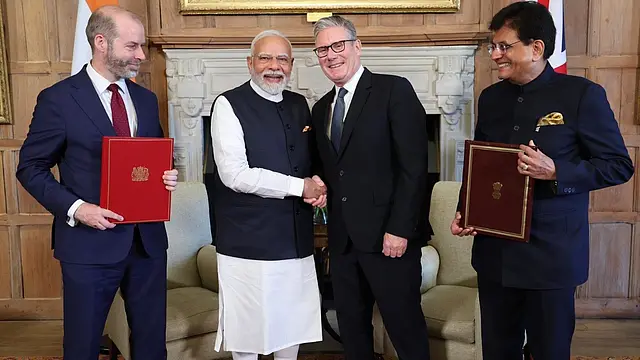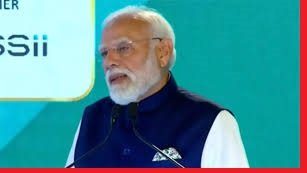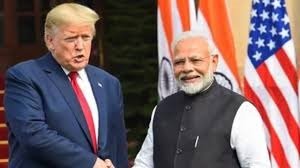Indian marine food exporters to benefit from tariff parity in UK market; trade pact ends disadvantage vs. Vietnam and Singapore, expected to boost exports, jobs, and coastal development.
New Delhi (Economy India): The recently concluded India-UK Comprehensive Economic and Trade Agreement (CETA) is expected to significantly enhance India’s export competitiveness, especially in the marine food sector. According to the Ministry of Fisheries, Animal Husbandry and Dairying, Indian exporters are now in a position to compete on equal terms with Vietnam and Singapore — two key Asian rivals that previously enjoyed tariff-free access to the United Kingdom under separate bilateral FTAs.
This strategic agreement comes at a time when India is actively seeking to diversify and expand its global export footprint, with seafood and aquaculture playing a vital role in the country’s Blue Economy strategy.

📊 India’s Marine Export Sector at a Glance
| Indicator | Value |
|---|---|
| Annual Marine Exports (FY 2024-25) | $8.09 Billion |
| Top Export Products | Frozen Shrimp, Frozen Fish, Squid, Cuttlefish |
| Leading Export Destinations | USA, China, EU, Japan, UK |
| Major Producing States | Andhra Pradesh, West Bengal, Gujarat, Odisha, Tamil Nadu |
India is the largest exporter of frozen shrimp in the world, and the UK has traditionally been among its top 10 seafood markets, especially for high-quality retail and restaurant-grade shrimp and fish.
🇬🇧 Impact of the UK Trade Deal
The UK-Vietnam FTA and UK-Singapore FTA had given seafood exporters from those countries a competitive pricing advantage in the British market. Their products entered duty-free, while Indian exporters faced import tariffs of 5–20%, depending on the item.
This pricing disparity led to:
- Reduced shelf space for Indian seafood in UK supermarkets
- Shrinking margins for Indian exporters
- Loss of market share to Vietnam and Singapore
With the India-UK CETA, these tariff barriers are removed, bringing Indian exporters on par with their ASEAN competitors.
🎯 Industry Response
The Marine Products Export Development Authority (MPEDA) has hailed the agreement as a milestone.
“This deal is a turning point for our seafood exporters. We are now playing on an equal field. With tariff parity, we expect exports to the UK to grow by at least 25% year-on-year over the next 3 years,” said an MPEDA official.
The Seafood Exporters Association of India (SEAI) has projected that exports to the UK could rise from the current $480 million annually to over $700 million by FY 2027, driven by improved price competitiveness and greater buyer confidence.
🐟 What It Means for Coastal India
The benefits of this trade deal extend beyond exporters. It will impact:
- Fishermen and Aquaculture Farmers
Higher demand will translate into better farm-gate prices, especially in shrimp and fish farming zones in Andhra Pradesh, Odisha, Gujarat, and Kerala. - Processing Units
With demand set to rise, processors are expected to invest in modern freezing, packaging, and traceability infrastructure to meet UK/EU compliance standards. - Logistics and Cold Chain
Increased volumes will encourage cold storage upgrades, container shipping, and faster last-mile delivery services at major ports like Visakhapatnam, Kochi, and Chennai. - Job Creation
Every $1 million in seafood exports supports 150–200 direct and indirect jobs. This deal could generate over 50,000 jobs in fishing communities and allied industries.
⚠️ Compliance Challenges Remain
While the trade deal eliminates tariff hurdles, non-tariff barriers remain:
- Stringent UK food safety standards
- Traceability and origin certification
- Sustainability and environmental compliance
India must invest in:
- Digital traceability platforms
- HACCP-certified processing units
- Sustainable aquaculture practices
- Third-party audit and quality testing labs
The Fisheries Ministry has proposed a ₹1,000 crore compliance support scheme for exporters under the Blue Economy framework.
🔍 India’s Broader Trade Strategy
The India-UK deal is part of a broader policy pivot:
| Region | Status |
|---|---|
| UK | Comprehensive Trade Agreement Signed |
| EU | Ongoing FTA Negotiations |
| Canada | FTA Talks Reopened |
| Australia | Interim Trade Agreement in Force |
| GCC | Early-stage Trade Engagement |
India aims to integrate its products into high-income markets, and seafood is one of the few commodities where India can scale quickly and compete globally with the right incentives.
📣 Political Backing
Prime Minister Narendra Modi praised the agreement, stating:
“This landmark deal will empower Indian farmers, fishermen, artisans and small businesses. It ensures quality products at better prices for everyday consumers.”
Union Commerce Minister Piyush Goyal emphasized that the deal reflects India’s intent to make global trade “fair, inclusive, and future-ready.”
The India-UK trade deal is not just a diplomatic milestone, but a structural transformation for India’s marine exports sector. It opens new doors in a premium market, removes long-standing disadvantages, and promises better income for India’s coastal workforce. To fully capitalize, India must now double down on quality, compliance, and sustainable production.
With growing global demand for healthy, traceable seafood and rising trade tensions elsewhere, this could be India’s moment to shine as a global seafood powerhouse.
(Economy India)













